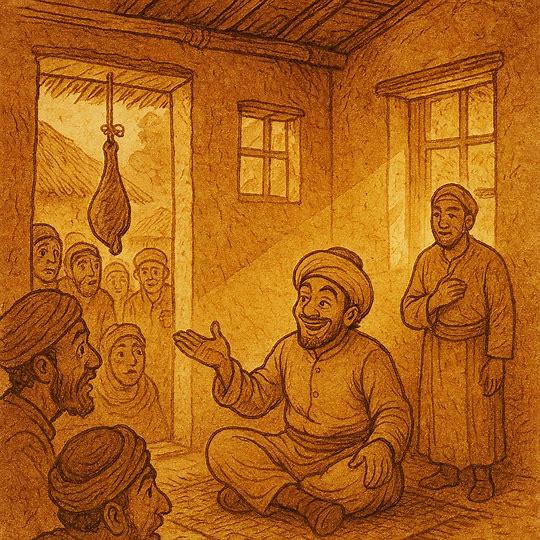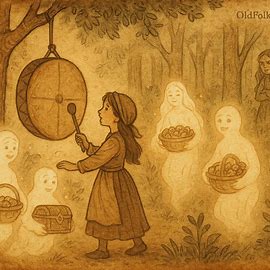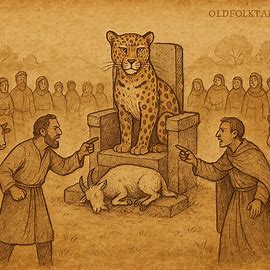Once upon a time in a coastal village of Eritrea, two men made a daring bet. One said to his companion, “If you spend a night in the middle of the sea, I will give you all my cattle. But if you fail, you must give me yours.” His companion agreed, though secretly terrified of the risk, for the sea at night was wild and unforgiving. Worry gnawed at him as he considered the potential loss of life against the promise of the cattle.
The fearful man sought advice from an old hag known for her wisdom. He recounted the bet and asked, “What should I do? I do not wish to die, yet I cannot back out.” The hag, smiling slyly, told him, “On the shore opposite where you will spend the night, have one of your relatives keep a fire burning bright all night. Keep your gaze fixed upon it, and its warmth will protect you.”
That night, he stepped into the sea, the cold waves lapping at him, his head above the water. Onshore, his mother tended the fire with unwavering care, ensuring the flames never faltered. Watchmen stood along the shore, ensuring he did not leave the water prematurely. Hours crawled by, the moonlight glinting on the restless waves, yet he focused on the fire, and by morning, he emerged from the sea alive.
Triumphantly, he approached the man with whom he had bet, demanding the cattle. “I have fulfilled our agreement. Now give me your cattle!” he insisted. But the other man, sly and stubborn, refused. “You only survived because you looked at the fire all night. That is not true courage,” he argued. Surrounding villagers echoed the sentiment: “Seeing the fire means you were protected. The bet is not fulfilled.”
READ THIS: The Tale of the Three Couples: A Tigrean Folktale That Teaches Lessons on Trust and Ingenuity
Disheartened, the man who had braved the sea wandered in search of help, eventually arriving at Abunawas, the legendary jester and clever thinker of the land. He recounted the entire ordeal: the bet, the sea, the fire, and the villagers’ judgment. Abunawas, known for his wit, listened intently, stroking his beard. “Do not worry,” he said confidently. “I have a remedy for this injustice, and you shall see justice done.”
Abunawas sent a message across his tribe, inviting everyone to a grand feast on a specific day. On that day, he had cattle and goats slaughtered, rice cooked, and instructed his servants, “Do not give a morsel to anyone until I command it. Hang all the food where it can be seen by all.”
The villagers gathered eagerly, their mouths watering at the aroma. They marveled, saying, “Abunawas has prepared a feast fit for kings.” Yet, as the day wore on, the food remained untasted, suspended before their eyes. Hunger gnawed at them, and curiosity turned to irritation. They sent a friend to ask Abunawas why the feast was withheld. The jester replied, “Are you not satisfied by the sight and smell of all this food? Do you need to taste it to be content?”
The villagers realized the lesson: sight alone cannot satisfy hunger. Abunawas then declared, “If seeing does not warm nor feed you, why was the man denied his rightful cattle for merely seeing the fire?” Understanding the clever parallel, they gave the cattle to the man who had spent the night in the sea. Only then did Abunawas allow the villagers to eat, having restored justice with wit and wisdom.
Thus, through cleverness and foresight, Abunawas ensured that fairness was achieved, and the man received what was rightfully his. And this is what the people say: justice favors not only strength and courage but also clever thought and reason.
Moral Lesson
True justice is not blind to circumstance; clever reasoning can restore fairness when rigid interpretations fail. One must recognize intent and effort rather than relying solely on appearances. Abunawas’ wisdom shows that intelligence and creativity can achieve what brute force or stubbornness cannot.
Knowledge Check
Who advised the man on surviving the night at sea?
An old wise hag.
What method allowed the man to survive the sea?
Keeping his gaze fixed on a fire burning onshore.
Why did the villagers initially refuse the man’s claim?
They argued that looking at the fire meant he was protected, not brave.
How did Abunawas ensure justice?
He staged a feast to teach the villagers a lesson about sight versus experience.
What lesson does the story teach about justice?
Justice must consider intent and clever solutions, not only appearances.
What is the cultural origin of the tale?
Eritrean folklore.
Source: Tigrean folktale, Eritrea






